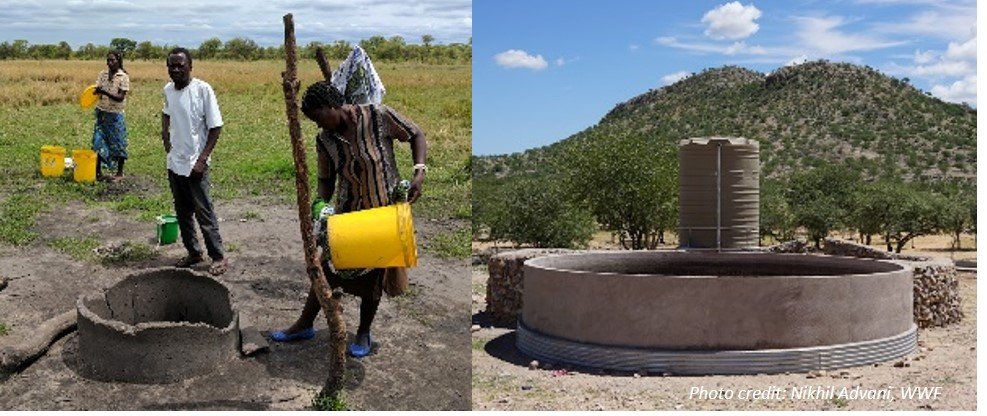Note: this is the 5th part of the series, Nature Protected and Lives Impacted, on ABCG’s Success Stories
Compiled by Chris Zganjar, The Nature Conservancy

Construction of wells and water tanks help communities maintain water supplies in times of drought, Kenya. Photo credit: Nikhil Advani, WWF
Rural communities in developing countries are on the front lines – the first to face the real impacts of climate change. Benefiting from the bounty that nature provides and coping with the times when nature takes back, defines the life of millions living in Sub-Saharan Africa. For generations this delicate balance was predictable, manageable, but in recent years, climate changes have become more abrupt and more extreme.
With these changes, key questions need to be asked. How is climate change affecting farmers, pastoralists and fishing communities? How is it impacting their way of life, their ability to feed their families or generate income? What must they do differently to maintain their way of life? And what is the fate of biodiversity in the face of these changes?
From 2015-2017, ABCG’s seven member organizations and partners went to communities to find out how climate change is affecting their lives. Over 600 interviews in communities engaged in farming, fishing and pastoralism across 19 different sites in 10 countries in sub-Saharan Africa (Cameroon, Gabon, Democratic Republic of the Congo, Kenya, Tanzania, Zambia, Namibia, Madagascar, Mozambique and Uganda) were conducted.
One farmer in Southern Kenya reported that, “Water used to be everywhere… we didn’t have to look hard for it. Now there is much less. Now our cattle drink from still water which can make them sick”. The story was same in 20 different communities in nine countries in Africa. Community members shared on how they are coping with these impacts and how local biodiversity is impacted.
In August 2018, ABCG brought together 36 stakeholders consisting of members of the surveyed communities, government officials, academics, and members of global environmental organizations in Nairobi, Kenya, to present the survey findings of the adaptation responses and how those responses impact biodiversity.
Results of the community surveys on how people respond to climate change and how those responses may impact biodiversity, along with an overview of the observed trends in climate throughout the surveyed countries were presented. Overall, the survey results show that about 35 percent of the adaptation responses identified through 652 surveys have potentially negative impacts on biodiversity, whereas only 12 percent have potential positive impacts.
Participants of this meeting discussed alternative adaptation responses to help farmers and fishermen adapt to climate change in ways that do not negatively affect biodiversity. Building on this knowledge and their own experiences, participants developed project ideas that could be implemented to help farmers and fisherman adapt to perceived climate threats that do not negatively impact biodiversity.
Through this activity, ABCG has been fostering a greater understanding and dialogue on emerging coping strategies already being adopted while exploring how those strategies can be improved upon. ABCG is building a knowledge base that will advance communities’ capacity to learn about climate threats and impacts, and approaches to address these challenges. Further, ABCG is developing strategies to address climate-driven issues on livestock, agriculture productivity, and fishing resources.The data collected from these interviews is available on World Wildlife Fund’s Climate Crowd website.
Read other blogs in this series:
- Preserving Madagascar’s Rich Biodiversity: How Land Use Planning Multi-sector Engagement is Turning the Tide
- Alleviating Malnutrition through Local Food Solutions and a Healthy Environment
- Empowering Communities to Protect Forest Ecosystems
- Delivering Safe and Reliable Water Supply: Spring Rehabilitation in South Africa’s Eastern Cape


Add a Comment